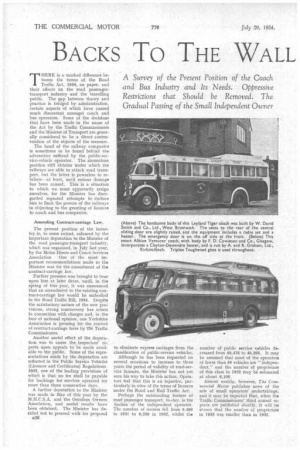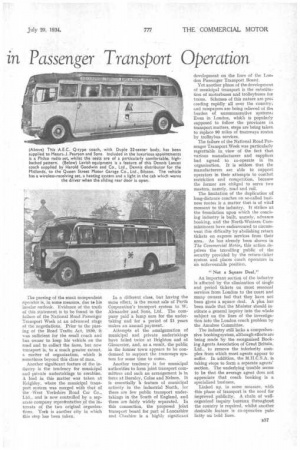BACKS To THE WALL
Page 50

Page 51

If you've noticed an error in this article please click here to report it so we can fix it.
in Passenger Transport Operation
A Survey of the Present Position of the Coach and Bus Industry and Its Needs. Oppressive Restrictions that Should be Removed. The Gradual Passing of the Small Independent Owner THERE is a marked difference between the terms of the Road Traffic Act, 1930. on paper, and their effects on the road passengertransport industry and the travelling public. The gap between theory and practice is bridged by administration, certain aspects of which have caused much discontent amongst coach and bus operators. Some of the decisions that have been made in the name of the Act by the Traffic Commissioners and the Minister of Transport are generally considered to be a direct contravention of the objects of the measure.
The hand of the railway companies is sometimes to be found behind the adversities suffered by the public-service-vehicle operator. The anomalous position still obtains under which the railways are able to attack road transport, but the latter is powerless to retaliate—at least, until serious damage has been caused. This is a situation to which we must apparently resign ourselves, for the Minister has disregarded repeated attempts to -.induce him to limit the powers of the railways in objecting to the granting of licences to coach and bus companies.
Amending Contract-carriage Law.
The present position of the industry is, to some extent, coloured by the important deputation to the Minister of the road passenger-transport industry, which was organized, in July last year, by the Motor Hirers and Coach Services Association One of the most important recommendations made to the Minister was for the amendment of the contract-carriage law.
Further pressure was brought to bear upon him at later dates, until, in the spring of this year, it was announced that an amendment to the existing contract-carriage law would be embodied in the Road Traffic Bill, 1934. Despite the satisfactory nature of the new provisions, strong controversy has arisen in connection with charges and, in the face of national opinion, one Yorkshire Association is pressing for the control of contract-carriage fares by the Traffic Commissioners.
Another useful effect of the deputation was to cause the inspectors' reports upon appeals to be made available to the public. Some of the representations made by the deputation are reflected in the Public Service Vehicles (Licences and Certificates) Regulations, 1933, one of the leading provisions of which is that no fee shall be payable for backings for services operated for more than three consecutive days.
A further deputation to the Minister was made in May of this year by the M,H.C.S.A. and the Omnibus Owners Association, and useful results have been obtained. The Minister has decided not to proceed with his proposal
B36
to eliminate express carriages from the classification of public-service vehicles.
Although he has been requested on several occasions to increase to three years the period of validity of road-service licences. the Minister has not yet seen his way to take this action. Operators feel that this is an injustice, particularly in view of the terms of licences under the Road and Rail Traffic Act.
Perhaps the outstanding feature of road passenger transport, to-day, is the decline of the independent operator. The number of owners fell from 6,456 in 1931 to 6,230 in 1932, whilst the number of public service vehicles decreased from 46,476 to 46,265. It may be assumed that most of the operators of fewer than 50 vehicles are "independent," and the number of proprietors of this class in 1932 may be estimated at about 6,100.
Almost weekly, however, The Commercial Motor publishes news of the sale of small operators' undertakings, and it may be expected that, when the Tra.ffic Commissioners' third annual reports are published shortly, it will be shown that the number of proprietors in 1933 was smaller than in 1932. The passing of the small independent operator is, in some measure, due te his insular outlook. Evidence of the truth of this statement is to be found in the failure of the National Road Passenger Transport Week at an advanced stage of the negotiations. Prior to the passing of the Road Traffic Act, 1930, it was sufficient for the small coach and bus owner to keep his vehicle on the road and to collect the fares, but now transport is, to a much greater extent, a matter of organization, which is sometimes beyond this class of man.
Another significant feature of the industry is the tendency for municipal and private undertakings to combine. A lead in this matter was taken at Keighley, where the municipal transport system was merged with that of the West Yorkshire Road Car Co., Ltd., and is now controlled by a separate company repre4entative of the interests of the two original organizations. York is another city in which this step has been taken.
In a different class, but having the same effect, is the recent sale of Perth Corporation's transport system to W. Alexander and Sons, Ltd. The company paid a lump sum for the undertaking and for a period of 21 years makes an annual payment.
Attempts at the amalgamation of municipal and private undertakings have failed twice at Brighton and at Gloucester, and, as a result, the public in the former town appears to be condemned to support the tramways system for some time to come.
Another tendency is for municipal authorities to form joint transport committees and such an arrangement is in force at Burnley, Colne and Nelson. It is essentially h feature of municipal activity in the industrial North, for there are few public transport undertakings in the South of England, and these are fairly widely separated. In this connection, the proposed joint transport board for part of Lancashire and Cheshire is a highly significant development on the lines of the London Passenger Transport Board.
Yet another phase of the development of municipal transport is the substitution of motorbuses and trolleybuses for trams. Schemes of this nature are pro; ceeding rapidly all over the country, and ratepayers are being relieved of thu burden of unremunerative systems.' Even in London, which is popularly supposed to follow the provinces in. transport matters, steps are being taken. to replace 90 miles of tramways routes by trolleybus services.
The failure of the National Road Passenger Transport Week was particularly regrettable in view of the fact that various manufacturers and suppliers had agreed to co-operate in it organization. It is seldom that the manufacturers are able to support operators in their attempts to combat restriction and competition, because the former are obliged to serve two masters, namely, road and rail.
The limitation of the duplication of long-distance coaches on so-called business routes is a matter that is of vital moment to the industry. It strikes at the foundation upon which the coaching industry is built, namely, advance booking, and the North-Western Commissioners have endeavoured to circumvent this difficulty by abolishing return tickets on express services from their area. As has already been shown in The Commercial Motor, this action deprives the travelling public of the security provided by the return-ticket system and places coach operators in an unfavourable position.
"Not a Square Deal."
An important section of the industry is affected by the elimination of single and period tickets on most seasonal services from London to the coast and many owners feel that they have not been given a square deal. A plea has been made that the Minister should institute a general inquiry into the whole subject on the lines of the investigation into the London coach problem by the Amulree Committee.
The industry still lacks a comprehensive booking system, although efforts are being made by the reorganized Booking Agents Association of Great Britain, Ltd., to remove the inferiority complex from which most agents appear to suffer. In addition, the M.H.C.S.A. is taking steps to form a separate agents' section. The underlying trouble seems to be that the average agent does not appreciate that coach hooking is a specialized business.
Linked up, in some measure, with this phase of transport is the need for improved publicity. A chain of wellorganized inquiry bureaux throughout the country is required, whilst another desirable feature is co-operative publicity on bold lines.




























































































